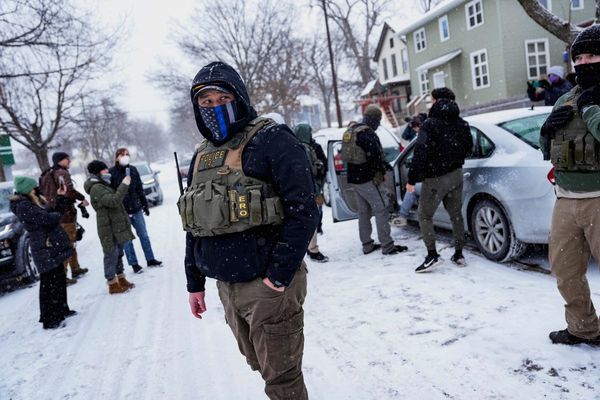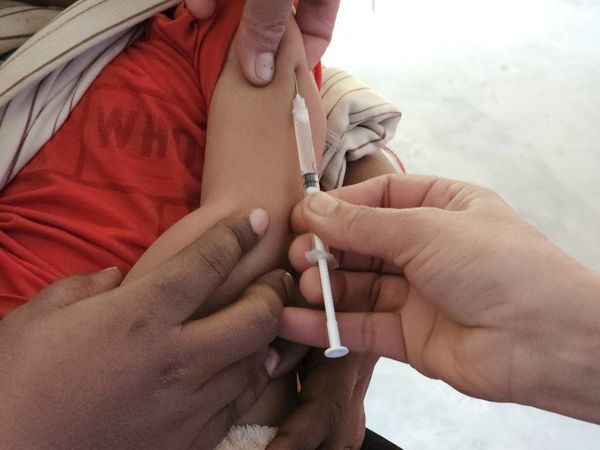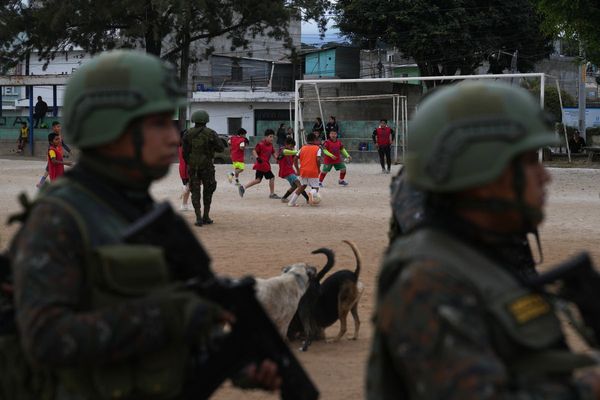The storming of Brazil’s seat of power by a mob of supporters of former president Jair Bolsonaro has put the spotlight on Brazil’s security forces, raising questions about their unpreparedness and incompetence, and perhaps even their complicity with protesters demanding the overturning of a democractic vote.
On Sunday evening, just hours after rioters stormed Brazil’s seat of power in a shocking, but entirely foreseen, attack on democracy, President Luiz Inacio Lula da Silva tore into the country’s security forces.
"There has been a lack of security today,” thundered Lula before accusing security forces of “incompetence, bad faith or malice” in allowing the rioters access to Congress, the Supreme Court and presidential palace in the capital, Brasilia.
Since the October 30 presidential second round handed Lula a slim victory over far-right incumbent Jair Bolsonaro, Brazilians have witnessed extraordinary sights in cities such as Sao Paulo, Rio de Janeiro and Brasilia.
Sporting the yellow-and-green colours of the national flag, Bolsonaro supporters set up protest camps right outside Brazilian military barracks and bases.
They pitched tarpaulin tents, fitted with camp beds, stocked with cans and others foodstuffs, and equipped with Internet access. Around them, vendors set up makeshift stalls, doing brisk business as Bolsonaro supporters vociferously called on the army to stage a military coup to “save Brazil”.
The country’s powerful armed forces did not heed their calls for a military intervention. But the generals did not dislodge or dismantle the protest camps in high security zones either, sending disquieting signals to Lula’s supporters.
Since he came to power in 2019, Bolsonaro, a former army second lieutenant, courted the military, appointing generals to his administration and attempting to put the military back on the political stage.
In the lead-up to the 2022 presidential vote, as Bolsonaro stoked fears of election fraud, he repeatedly called on the military to stop the upcoming steal. In the months that followed the far-right candidate’s defeat, Brazil was on edge as a polarised nation awaited Lula’s January 1 inauguration.
Sunday’s scenes of carnage have put the spotlight on Brazil’s security forces as the country witnessed its worst attack on state institutions since its return to democracy in the 1980s.
Disaster foretold, but police unprepared
In the charged hours of Sunday, as Bolsonaro supporters stormed and thrashed government buildings, social media sites were awash with video clips of some police officers laughing and taking photos as rioters occupied the buildings.
At his press conference in the southeastern city of Araraquara, where he was visiting a flood-hit region, Lula blasted the police response, or lack thereof.
"You will see in the images that they [police officers] are guiding people on the walk to Praca dos Tres Powers," said Lula, referring to the square that houses the presidency, Supreme Court and Congress.
The security failures were inadmissible considering the level of planning and preparation for Sunday’s protests, according to Fabio de Sa e Silva, professor of Brazilian studies at the University of Oklahoma and a former Brazilian justice ministry official.
“It was clear it was going to happen. Groups were active on the Internet, people were traveling to Brasilia, buses were organised to get them there. This was clearly anticipated and the police should have been ready to respond,” said de Sa e Silva.
Police chief and former president in Florida
Amid questions over whether the slow police reaction was due to an underestimation of protesters’ strength or complicity with their intent, attention was immediately focused on the capital city’s police force, led by public security chief, Anderson Torres, who previously served as Bolsonaro's justice minister.
Torres however was not in town. The former justice minister had left Brazil on Saturday for a vacation to Orlando, Florida.
The police chief’s vacation destination raised eyebrows since Bolsonaro also happens to be in Orlando. The former Brazilian president left for Florida last month and has been living in a rented house owned by a professional mixed-martial-arts fighter a few miles from Disney World, according to the New York Times.
Torres denied that he went to Orlando to meet with Bolsonaro, but it was too late. Brasilia Federal District Governor Ibaneis Rocha on Sunday confirmed on Twitter that he had fired Torres.
But it was too late for Brasilia’s governor as well. Hours later, Supreme Court Justice Alexandre de Moraes ordered Rocha removed from his position for 90 days.
In his decision, Justice de Moraes wrote that the day's events could only have transpired “with the consent, and even effective participation, of the competent public security and intelligence authorities”, and called Rocha's actions “intentionally omissive”.
Politicised police
Concerns over the politicisation of Brazil’s military police, who report to state governors, increased during the Bolsonaro years and peaked in the aftermath of his electoral defeat.
While the military police do routine policing work in Brazil, they are also classified as reserve forces of the Brazilian army.
“The military police is much more pro-Bolsonaro. There were always concerns that the state police would fail to contain a situation like this,” explained Christopher Sabatini, senior researcher at the London-based Chatham House.
Bolsonaro began courting the police force in the lead-up to the 2018 election, when he ran a campaign promising a crackdown on criminals in a country with high crime as well as a high extra-judicial killing rates.
“He politicised the police forces although he didn’t do much for the police, such as raising their salaries or providing them better equipment. He just supported them symbolically by talking about respect for the police and calling for tough punishments for criminals. This kind of discourse was sufficient to galvanise support among the police forces,” explained de Sa e Silva.
Military in barracks, far-right groups at their doorstep
The serious courting of security forces was aimed at the military. During Bolsonaro’s tenure, nearly one-third of his ministerial appointments were generals, and more than 6,000 military personnel were appointed to the administration.
But despite the calls for a military intervention to overturn the leftist Lula’s election victory, Brazil’s armed forces stayed on the sidelines of the latest political crisis.
“High-ranking officers and soldiers tend to be more institutional, especially in the navy and air force. They are more committed to the constitutional order. But Bolsonaro has a fair amount of support within the lower ranks of the military. He is regarded as one of them, he speaks their language,” said Sabatini.
The military’s tolerance of protest camps right outside army headquarters and barracks in key Brazilian cities displayed the bonds that bind the armed forces to Bolsonaro’s supporters, according to some experts.
“You can’t conceive of a leftist group camping outside a military facility in Brazil for more than two months. That shows some level of support and complicity,” noted de Sa e Silva. “Bolsonaro’s attempt to draw military support for a self-coup was not answered, perhaps because of a lack of international support. But it’s not enough to not do something crazy, they must do what’s needed to defend democracy. The defence minister thought, let’s be soft, let’s give it time and expect a natural demobilisation. Clearly, it’s not going to happen naturally.”
The morning after the riots, soldiers backed by police broke down a pro-Bolsonaro camp encampment outside the military base in Brasilia on Monday.
Around 1,200 people at the camp were detained and police have begun tracking those who paid for the buses that transported protesters to the capital, according to the justice ministry.
Managing military and Bolsonaro supporters
But Lula still faces challenges within the security forces as well as the wider public.
During his past two presidential terms from 2003 to 2010, Lula never confronted the military directly.
On the other hand, his successor, Dilma Rousseff, reawakened the army's traditional hostility to the left by launching a National Truth Commission in 2011, charged with investigating crimes committed by the junta between 1964 and 1985.
Rousseff never made it to the end of her term and was impeached on corruption charges.
“Lula is a conciliatory politician. While he’s obviously from the left, he tries to be conciliatory. He has appointed a defence minister [José Múcio Monteiro] that the military likes or at least did not resist. He also calls on people to remember that during his past terms, the government did not meddle with the military, unlike the Dilma administration,” said de Sa e Silva.
Four decades after Brazil emerged from brutal military rule, the country’s military has still not been held accountable for gross human rights violations.
The polarisation of the populace meanwhile has increased since 2014-2015, with a far-right movement backed by powerful business interests in Brazil as well as powerful ideologues in the US.
“Lula is in a very delicate position,” noted Sabatini. “He has to restore order in Brasilia, he has to assert democratic rule of law, and he has to find a way to heal the country. But that’s not easy because many Brazilians believe the election was stolen and they have a hatred for Lula, who they call a godless communist (he’s not). It’s a very radicalised public and it will be very challenging.”







